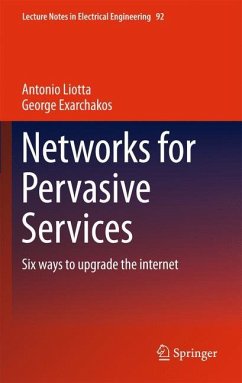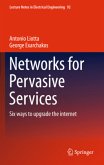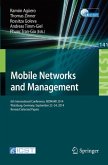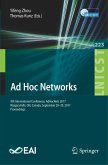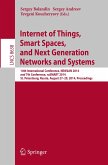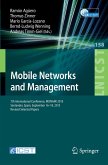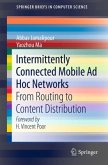Prof. Raouf Boutaba, University of Waterloo (Canada)
Since its inception in the 1970s the Internet has become larger, faster and wireless. It is the biggest machine ever built, the generative engine of our digital society. However, the software that runs the global network has not seen any substantial upgrade since the early 1990s. It is now evident that the existing mechanisms that transport data around the Internet are no longer adequate for the new breed of Web applications. This book explains why the time is ripe for a complete overhaul in view of the Future Internet. Through a series of simple examples, the authors present a wealth of network mechanisms, starting from those that sustain the Web today. Readers will become familiar with a range of advanced protocols that will make the Internet more ubiquitous, reactive, proactive, information-driven, distribution-efficient and searchable. This book presents a selection of remarkable research ideas, making them accessible to the non-specialist reader. Readers will progress from an understanding of what the Internet is now towards an understanding of the motivations and techniques that will drive its future.
Since its inception in the 1970s the Internet has become larger, faster and wireless. It is the biggest machine ever built, the generative engine of our digital society. However, the software that runs the global network has not seen any substantial upgrade since the early 1990s. It is now evident that the existing mechanisms that transport data around the Internet are no longer adequate for the new breed of Web applications. This book explains why the time is ripe for a complete overhaul in view of the Future Internet. Through a series of simple examples, the authors present a wealth of network mechanisms, starting from those that sustain the Web today. Readers will become familiar with a range of advanced protocols that will make the Internet more ubiquitous, reactive, proactive, information-driven, distribution-efficient and searchable. This book presents a selection of remarkable research ideas, making them accessible to the non-specialist reader. Readers will progress from an understanding of what the Internet is now towards an understanding of the motivations and techniques that will drive its future.
From the reviews:
"In this book, Antonio Liotta and George Exarchakos have successfully tackled the challenge of explaining in easy to understand terms how the Internet works today and how it could be upgraded. The first two chapters of the book deal with how the Internet works today. The next seven chapters deal with how it could be upgraded ... . I strongly recommend the book to non networking specialists who are not 'dummies,' but have a keen interest in the Internet and its evolution." (Roch Glitho, IEEE Communications Magazine, February, 2012)
"This book presents the old and well-known concepts so that readers can understand them. This is helpful, since no computer network expert knows all of the concepts. ... The book is quite instructive and timely, and presents all concepts, both new and existing. ... an interesting read for students, or for those who are interested in computer networks but don't have the technical knowledge. Professionals and researchers in the computer networking field will also find the book interesting, as it offers new ideas and discussions." (Kalinka Castelo Branco, ACM Computing Reviews, September, 2011)
"In this book, Antonio Liotta and George Exarchakos have successfully tackled the challenge of explaining in easy to understand terms how the Internet works today and how it could be upgraded. The first two chapters of the book deal with how the Internet works today. The next seven chapters deal with how it could be upgraded ... . I strongly recommend the book to non networking specialists who are not 'dummies,' but have a keen interest in the Internet and its evolution." (Roch Glitho, IEEE Communications Magazine, February, 2012)
"This book presents the old and well-known concepts so that readers can understand them. This is helpful, since no computer network expert knows all of the concepts. ... The book is quite instructive and timely, and presents all concepts, both new and existing. ... an interesting read for students, or for those who are interested in computer networks but don't have the technical knowledge. Professionals and researchers in the computer networking field will also find the book interesting, as it offers new ideas and discussions." (Kalinka Castelo Branco, ACM Computing Reviews, September, 2011)

